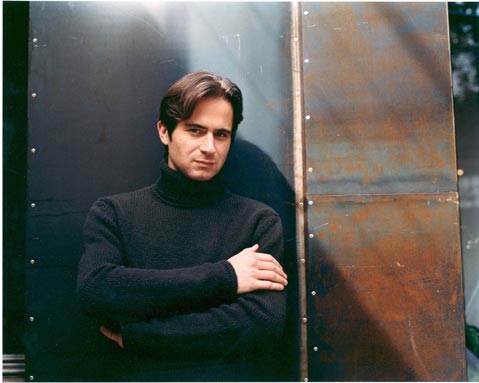CAMA Presents Its 90th Season of Vital Performances
Putting the Master in Masterseries

What’s the point of classical performance today? It’s a question that even seasoned listeners who attend concerts regularly might have trouble answering. But for the team that produces the two world-renowned CAMA concert series in Santa Barbara-the International Series at the Granada and the Masterseries at the Lobero-defining the purpose and recognizing the potential of contemporary musical performance is nothing less than an obsession.
As a result, CAMA, especially in the Masterseries, has made a long-term commitment to the powerful contemporary ideal of the virtuoso as intellectual. It’s an idea that appears as definitive at the start of 21st century music as the ideal of the composer as romantic hero was for Ludwig van Beethoven at the beginning of the 19th. For the virtuoso as intellectual-whether that’s the great pianist Glenn Gould, who arguably started the trend, the percussionist Evelyn Glennie, or the violist and early music auteur Jordi Savall, who visited the Masterseries just last year-the goal of musical performance always remains the same: to achieve a level of musical expression that precipitates new kinds of thinking and feeling. Where it might have been acceptable a generation ago to see great instrumental talent as an end in itself, the generation of musicians now in their thirties and forties has come to another conclusion. For these young masters, technique exists to serve vision, and virtuosity must function as the instrument of an ever more comprehensive cultural understanding.
The virtuoso as intellectual operates on many planes, from the commercial and academic juggernaut that is YoYo Ma’s Silk Road Project to the extraordinarily rigorous approach to the music of Beethoven taken by this year’s first Masterseries performer, the pianist Piotr Anderszewski. Anderszewski began to make an impression on the international piano scene in the early 1990s with his performances of Beethoven’s notoriously difficult solo Diabelli Variations. As with Glenn Gould and Bach’s Goldberg Variations, this hour-plus of incredibly demanding music became Anderszewski’s calling card, first at competitions, where much less difficult music is generally the order of the day, and then on disc, when he recorded the work for Virgin Classics as his first release in 2000.
On his most recent recording for Virgin, Anderszewski takes a distinctively “late” approach to Beethoven’s Concerto No. 1, and, seemingly to underline this reappraisal of the earlier work, he has included the composer’s Bagatelles for Piano. For his program at the Lobero on Thursday, October 16, Anderszewski will play some Bagatelles by Bart³k, two Bach Partitas, and a very great late Beethoven work, the Piano Sonata No. 31 in A-flat major, Op. 110. This is the Beethoven sonata that the philosopher and music critic Theodor Adorno called “unabashedly primitive,” even while extolling the merits of its disjunctive style in his characteristically knotty, evocative prose as “a catching fire between extremes, which no longer allow for any secure middle ground or harmony of spontaneity.” Expect late Romantic fireworks and true sonata mysticism from this Gilmore Award-winning musician when he arrives next Thursday.
Two weeks later, on Wednesday, October 29, at the Granada, CAMA will welcome the Jerusalem Symphony Orchestra as the first of five orchestras in its International Series. JSO conductor Leon Botstein, president of Bard College and a noted scholar and essayist on American education, brings his own brand of intellectual stimulation to town in the form of two relatively familiar American works-Aaron Copland’s Symphony No. 3 and Leonard Bernstein’s Serenade-and an exceedingly rare complement to them, Erich Sternberg’s The Twelve Tribes of Israel.
After that, it’s back to the Lobero for two more extraordinary Masterseries concerts before the end of the year. On Monday, November 17, British composer/pianist Thomas Ads (composer of Asyla, Powder Her Face, and The Tempest) will be joined by the violinist Anthony Marwood (a member of the Florestan Trio) in an evening devoted to the music of Igor Stravinsky. In an amazing coincidence, Ads has been working with Marwood on the same Stravinsky transcriptions done for the composer and violinist Samuel Dushkin that Stravinsky performed at the Lobero on March 16, 1937. The combination of this young artist, who is among the foremost composers of his generation, and the music of Stravinsky should be extremely exciting.
And on Tuesday, December 2, the violinist Christian Tetzlaff will arrive to test the acoustics of the Lobero with a recital of solo violin sonatas and partitas by J. S. Bach. Those who were fortunate enough to witness Edward Dusinberre’s performance of a Bach solo violin piece last July in this space as part of one of the Music Academy’s Chamberfests know what drama awaits, as the Lobero must be one of the greatest venues for solo violin anywhere. Veteran promoter, longtime Lobero board member, and CAMA mastermind Steve Cloud promises that with Tetzlaff, the virtuosity is “off the Richter scale.” In other words, given the right venue and the right audience, the best contemporary classical performers know how to move the world.
4•1•1
For complete information about the full season of CAMA, call 966-4324 or visit camasb.org.



